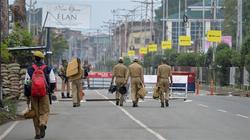 India has introduced a new law that would make its citizens eligible to become permanent residents of the Indian-administered Kashmir, raising fears of demographic change in the Muslim-majority, Himalayan region.
India has introduced a new law that would make its citizens eligible to become permanent residents of the Indian-administered Kashmir, raising fears of demographic change in the Muslim-majority, Himalayan region. RNA - The new law, which was announced by the Indian Ministry of Home Affairs on Wednesday and which reportedly is not subject to parliamentary review, will deem any person who has resided in the Indian-controlled Kashmir for a period of 15 years or studied at certain school grades there as “domicile” of the territory.
The new law will also provide domicile status to the children of central government officials who have served in the Indian-controlled Kashmir for a total period of 10 years.
It will also open local jobs to non-residents.
The introduction of the law comes almost eight months after the Indian government stripped the disputed region of its limited autonomy. On August 5 last year, New Delhi revoked Article 370, a constitutional provision that had come into effect in 1949 and had granted special status to Kashmir, allowing it to have its own flag and constitution, among other rights.
In the lead-up to the revocation, India sent thousands of additional troops to the disputed region, imposed a curfew, arrested political leaders, and shut down telecommunication lines.
The new law also comes as the country of 1.3 billion people is under a 21-day lockdown in an attempt to prevent the spread of the new coronavirus, raising speculation that the timing is intentional.
Legalizing settlements?
Residents in the Indian-controlled Kashmir fear that the new law would alter the demographic status of the region, with experts saying it will lead to “demographic flooding.”
“It is a lot to circumvent the law. I think it illustrates clearly that some will not stop from politicking during coronavirus [epidemic],” Siddiq Wahid, a political analyst based in the Indian-controlled Kashmir, said.
“Obviously it is an attempt to change the demographics, not only change but flood it. It will lead to demographic flooding,” Wahid said, according to Al Jazeera.
Sheikh Showkat Hussain, a professor of legal studies based in the region, said the move had already been in the offing.
“The whole purpose of revoking Article 370 was to settle outsiders here and change the demography of the [Jammu and Kashmir] state. Now this provides the modalities and entitles so many categories of Indians whose settlement will be legalized over here.”
India’s ruling Hindu-nationalist Bharatiya Janata Party (BJP) has denied that the new law is an attempt to change the demography of the region.
Kashmir has been split between India and Pakistan since partition in 1947. Both countries claim all of Kashmir and have fought three wars over the territory.
Meanwhile, Muslims elsewhere in India have also been facing abuse and violence.
*****
112/940